Publications
August 18, 2023
New ADAI Report: The Status of MOUD Provision in Washington State Jails, 2021
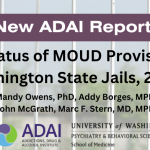
ADAI has a new report out, authored by Mandy Owens, PhD (UW ADAI), Addy Borges, MPH (UW Dept of Child, Family, and Population Health Nursing), John McGrath (WA Assoc. of Sheriffs and Police Chiefs), and Marc F. Stern, MD, MPH (UW Dept of Health Systems and Population Health). Individuals releasing from incarceration are at an…
June 14, 2023
New Report & Webinar: Unmet Needs, Complex Motivations, and Ideal Care for People Using Fentanyl in WA State
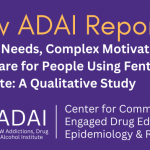
In Fall 2022, the CEDEER Team conducted interviews with 30 WA State syringe services participants who use fentanyl. The purpose of these interviews was to better understand people’s motivations for using fentanyl and what ideal care would look like for them. What did we learn? Want to learn more?
April 18, 2023
Detailed Fentanyl Drug Testing Results for King County (WA Medical Examiner Samples)
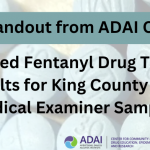
“Detailed fentanyl drug testing results for King County, WA Medical Examiner samples” is a new handout on the StopOverdose.org website with photos of drugs and detailed chemical analyses. Results show a broad range of fentanyl content and highly variable appearances. In February 2023, the King County Medical Examiner sent 12 fentanyl samples to the Drug…
February 22, 2023
New ADAI Report & Virtual Tour: Overview and Perspectives of Syringe Services Programs in WA State
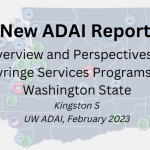
New ADAI Report This new report, Overview and Perspectives of Syringe Services Programs in Washington State, written by Susan Kingston of the ADAI Center for Community-Engaged Drug Education, Epidemiology and Research (CEDEER), describes how Washington State syringe services programs (SSPs) operate, the services they provide, the challenges they face, and their untapped potential. Citation: Kingston…
February 8, 2023
New from ADAI: Community Implementation of Contingency Management to Address Stimulant Use (Hartzler, 2023)
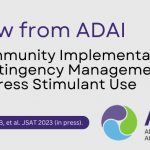
A new publication by ADAI Research Associate Professor Bryan Hartzler, PhD and colleagues reports outcomes of an interagency partnership among the Northwest ATTC, Oregon Health Authority, and Oregon Recovery and Treatment Centers, LLC. This partnership involved an intensive technical assistance project in which opioid treatment programs successfully implemented customized contingency management programming to increase stimulant abstinence…
February 6, 2023
New: How Should Policymakers Regulate the THC Content of Cannabis Products? (Opinion piece in Addiction)
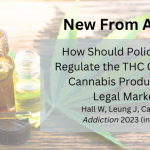
Since the sale of cannabis to adults was first legalized in Colorado and Washington State in 2012, the THC content of cannabis flower has increased and so have sales of high-potency cannabis vapes, extracts, and concentrates. Increased use of higher THC cannabis products can lead to increased cannabis-related harms, including accidents, adverse psychological reactions, psychotic…
February 3, 2023
New Research: “Like it was just everyday business”: Experiences of Pharmacy Customers Requesting Naloxone or Syringes

As rates of overdoses involving opioids continue to rise in the U.S., community pharmacies are increasingly being seen as a way to provide easier and expanded access to harm reduction supplies like naloxone and non-prescription syringes (NPS). This article, co-authored by ADAI Research Associate Professor Anthony S. Floyd, PhD, looks at what customers thought of…
January 30, 2023
High THC Policy | Final Report: Exploring Policy Solutions: Report to the WA Legislature
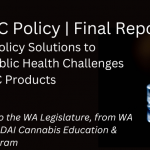
To address this emerging public safety challenge of increasingly available high-THC products (e.g. dabs, wax, concentrates), the WA State Health Care Authority was directed by ESSB 5092 (2021) to contract with the University of Washington’s Addictions, Drug & Alcohol Institute (ADAI) to identify areas of common ground and consensus, and develop recommendations for state policies related to cannabis concentration…
November 30, 2022
ADAI CERP Report to Legislature Details Public Health Risks for High-THC Cannabis
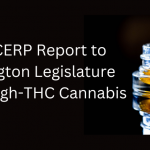
In early fall, ADAI Acting Associate Professor Beatriz Carlini, PhD, MPH and her team at the Cannabis Education & Research Program (CERP) published and delivered a report to the Washington State legislature that addresses the public health challenges of cannabis products with high concentrations of THC, the psychoactive ingredient in cannabis that causes a “high.”…
November 23, 2022
New from ADAI: Provider Perspectives on Medication Treatment for OUD in Adolescents
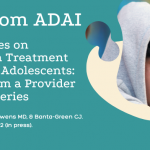
Despite recent surges in adolescent opioid use disorder (OUD), teens are less likely to enter treatment compared to adults, and are rarely in treatment settings that offer evidence-based medication treatment (methadone, buprenorphine, and naltrexone). Buprenorphine is the only medication approved for people under 18 (aged 16 and older) and methadone requires written parental consent for…
Previous page Next page
